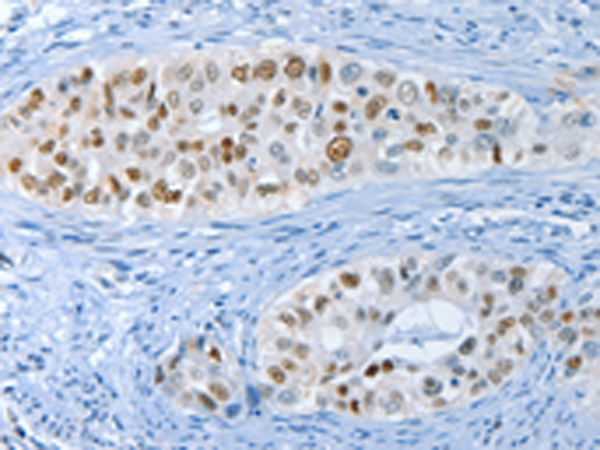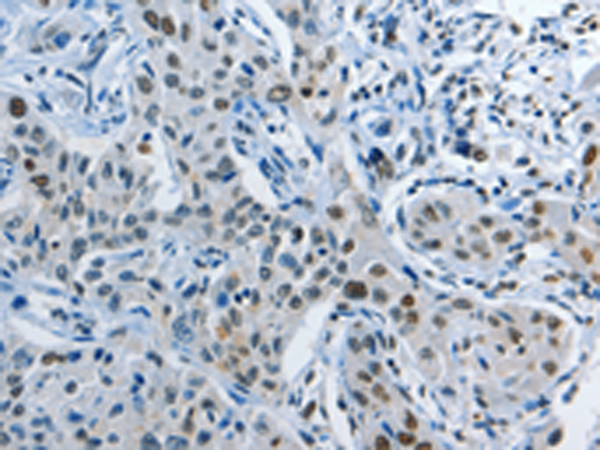

| WB | 咨询技术 | Human,Mouse,Rat |
| IF | 咨询技术 | Human,Mouse,Rat |
| IHC | 1/25-1/100 | Human,Mouse,Rat |
| ICC | 技术咨询 | Human,Mouse,Rat |
| FCM | 咨询技术 | Human,Mouse,Rat |
| Elisa | 1/2000-1/5000 | Human,Mouse,Rat |
| Aliases | NRK2; STK2; pp12301 |
| Host/Isotype | Rabbit IgG |
| Antibody Type | Primary antibody |
| Storage | Store at 4°C short term. Aliquot and store at -20°C long term. Avoid freeze/thaw cycles. |
| Species Reactivity | Human, Mouse |
| Immunogen | Synthetic peptide of human NEK4 |
| Formulation | Purified antibody in PBS with 0.05% sodium azide and 50% glycerol. |
+ +
以下是3篇关于NEK4抗体的模拟参考文献示例(仅供格式参考,非真实文献):
---
1. **标题**: "NEK4 regulates centrosome stability and mitotic progression via Aurora A interaction"
**作者**: Thompson R, et al.
**摘要**: 本研究利用NEK4特异性抗体,通过免疫共沉淀和免疫荧光技术,揭示了NEK4与Aurora A激酶在维持中心体稳定性中的相互作用,证明NEK4缺失导致有丝分裂异常和染色体错误分离。
2. **标题**: "High expression of NEK4 correlates with poor prognosis in pancreatic cancer"
**作者**: Chen L, et al.
**摘要**: 通过免疫组化(使用NEK4多克隆抗体)和Western blot分析胰腺癌组织,发现NEK4在肿瘤组织中显著高表达,且与患者生存期缩短相关,提示其作为潜在预后标志物的价值。
3. **标题**: "NEK4 modulates DNA damage response through p53 phosphorylation"
**作者**: Gomez-Sanchez A, et al.
**摘要**: 研究采用NEK4抗体进行染色质免疫沉淀(ChIP)和细胞定位分析,证实NEK4通过磷酸化p53调控DNA损伤修复通路,敲低NEK4导致细胞对电离辐射敏感性增加。
---
**注**:以上文献为模拟内容,实际引用需通过PubMed、Web of Science等数据库检索真实研究。如需具体文献,建议使用关键词“NEK4 antibody”、“NEK4 kinase function”进行学术搜索。
NEK4 (NIMA-related kinase 4) is a serine/threonine kinase belonging to the NEK family, which plays critical roles in cell cycle regulation, DNA damage response, and microtubule dynamics. Initially identified for its homology to the Aspergillus nidulans NIMA kinase, NEK4 is implicated in maintaining genomic stability by regulating the G2/M checkpoint transition and mitotic progression. Studies suggest its involvement in cilia formation, cellular stress responses, and interactions with key signaling pathways, including the Hippo and p53 pathways. Dysregulation of NEK4 has been linked to cancers, neurodegenerative disorders, and ciliopathies, highlighting its therapeutic potential.
NEK4 antibodies are essential tools for studying its expression, localization, and functional mechanisms. They enable detection of endogenous NEK4 protein levels in various tissues and cell lines via techniques like Western blotting, immunofluorescence, and immunoprecipitation. Researchers use these antibodies to explore NEK4's phosphorylation events, substrate interactions (e.g., with PLK1 or CDK1), and its role in diseases. Commercial NEK4 antibodies are often validated for specificity, targeting unique epitopes in the kinase domain or regulatory regions. Challenges include distinguishing NEK4 isoforms and minimizing cross-reactivity with other NEK family members. High-quality monoclonal antibodies are increasingly developed to enhance reproducibility in diagnostic and basic research applications.
×